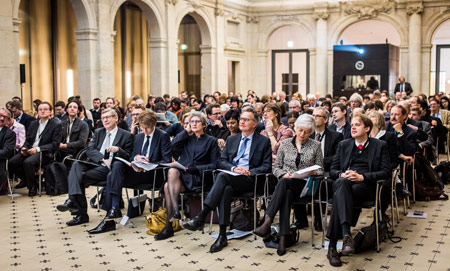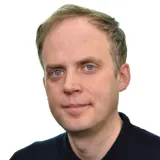21 April 2015
European Holocaust Research Infrastructure project receives €8 million grant
A Holocaust research project involving King's academics has been awarded €8 million by the EU for a second phase of work

A Holocaust research project involving King's academics has been awarded €8 million by the EU for a second phase of work.
The European Holocaust Research Infrastructure (EHRI) project was launched in 2010 to provide digital access to Holocaust material including photos, films, art, objects and documentation.
The portal was launched in Berlin last month and currently provides access to more than 1,800 Holocaust-related archives in 51 countries, including the US Holocaust Memorial Museum and Yad Vashem in Israel.

VIPs at the EHRI launch event. First row (starting from the right) are: Tobias Blanke, Cornelia Quennet-Thielen (State Secretary at the Federal Ministry of Education and Research, Germany), Robert-Jan Smits (Director General of DG Research and Innovation, European Commission), Conny Kristel (project co-ordinator EHRI, NIOD Institute for War, Holocaust and Genocide Studies, Amsterdam), Sander Dekker (State Secretary for Education, Netherlands), Marek Ratajczak (Secretary of State at the Ministry of Science and Higher Education, Poland). Photo credit: Marko Priske. The copyright for the photo lies with the European Holocaust Research Infrastructure.
The new funding (May 2015-April 2019) will enable the EHRI to deepen and strengthen the activities they undertook during the first phase which ran from October 2010 to March 2015. These activities include: integrating information on Holocaust-related archival sources that are dispersed across hundreds of institutions around Europe and beyond in the EHRI Online Portal, and building a transnational and interdisciplinary network of Holocaust researchers, archivists and digital humanists.
The funding will also help them to embark upon new activities such as employing state-of-the-art digital methods to analyse and interpret large amounts of archival data; reach out to, and network with, researchers and institutions that operate in regions that do not possess strong infrastructures for Holocaust research, especially in Eastern and South-Eastern Europe.
"New technologies coming from the so-called “Big Data” domain hold a lot of potential to enhance and transform Holocaust research. Holocaust historians are faced with ever increasing amounts of digital data, and EHRI will develop innovative methods and tools that facilitate the analysis of such data," says Dr Tobias Blanke, a Senior Lecturer at King’s College London’s Centre for e-Research and lead partner on the project.
His colleague Dr Reto Speck, Research Fellow at the Department of Digital Humanities is also working on the project, and he says the new funding will enable EHRI to build upon the strong foundations that have been laid over the last four years.
"In spite of the impressive information base that we have already made available via the EHRI Online Portal, we know that are still hundreds of archives, located mainly in Eastern and South-Eastern Europe, that hold thousands of Holocaust-relevant collections that have hardly been used in research, because these archives have so far not been plugged into the Holocaust research landscape."
"EHRI will identify these archives and collections and connect them to the holdings of other, well-known institutions. By thus networking information, people and institutions, EHRI will enable the study of the Holocaust from a truly pan-European perspective," says Reto.

